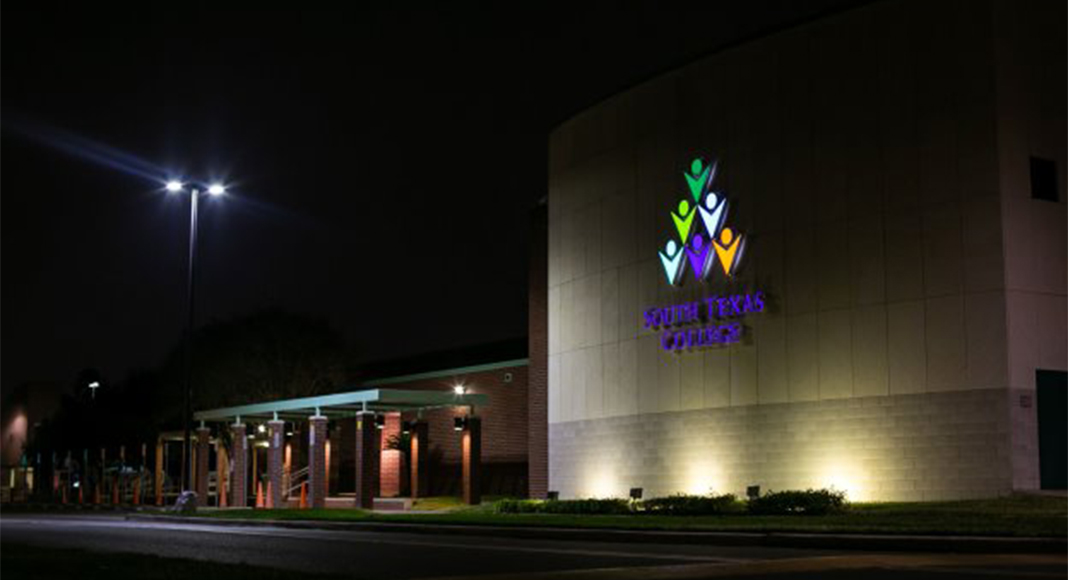
Texas Border Business
MCALLEN, TEXAS – Impromptu chats at the coffee machine. Swapping movie and book recommendations in the hallway. Getting charged up to go to class with new info or a fresh perspective.
For history instructor Robert “Sean” Kennedy, those small connections made a huge difference at South Texas College.
“Before the pandemic, I didn’t realize that was actually a crucial part of my day,” says Kennedy. In an effort to foster connection, engagement, and a sense of normalcy as instruction jumped online last year, the professor started hosting twice-a-week “Evening Chats” as a way to connect.
“It was a way of reaching out to colleagues and inviting students along for the ride,” recalls the professor.
Topics ranged from “Earth Day in the RGV” with Scott Nicol to “Søren Aabye Kierkegaard and Religion in the USA” with Chris Nelson and “A Brief History of Music in the USA” with John Terry.
“I would just ask the faculty members, ‘Hey, is there anything you’d be interested in talking about?’” remembers Kennedy. The professor was surprised at how popular the events were. Surely, not even extra credit opportunities could explain the attendance of up to 150 learners at some events.
“This was a great conversation, and I really enjoyed it,” one Evening Chat participant writes. “I can’t wait for the next one because I would like to hear more about what my classmates have to say on other topics.”
During a time when campus was closed, lively discussions helped learners connect and see things from different perspectives. Says the pleasantly surprised professor, “Students were highly engaged and asking really good questions.”
One of the most well-attended talks was “Plessy v. Fergusson and Yick Wo. v. Hopkins,” moderated by Dr. Andres Molina Ochoa. “Most people have heard at least about Plessy v. Fergusson,” Kennedy says, “but I don’t think anybody, unless they are studying Supreme Court law, knows Yick Wo. v. Hopkins.”
The latter is the case of a Chinese immigrant who went to the Supreme Court to fight for his business rights in the face of discrimination. For Assistant Professor of Philosophy Dr. Ochoa, nothing could have been more timely… or more personal.
“My wife is Chinese, and I am Colombian, so my son is like a double minority,” says Ochoa. “I wanted to contribute to the understanding of minorities in the United States to fight against hate.”
Both cases were decided in 1886, but the professor says there are parallels with current events happening right now. In particular, the Plessy v. Fergusson case, which set the legal foundation for racial segregation laws, opens conversations about how we understand and interpret the constitution to this day. According to the presenter, “I think it’s a good opportunity to speak about a topic that I usually don’t cover in my classes.”
Beyond his particular event, Ochoa says the Evening Chats have provided an intellectually stimulating environment for the STC community.
“You learn as much from other students and from the social and cultural life of universities as from the classes themselves,” he says.
Meanwhile, he believes the Evening Chats create an ecosystem of innovation and foster learners’ curiosity. “Most of the students who have been in these chats are very interested,” says Ochoa. “They really like it.”
Indeed, the time was right to explore creative collaboration on new platforms. And while many of the innovations spawned by the health crisis have persisted, it’s the connection with students that has carried some faculty through.
“It’s a great opportunity to remember the things that make your career great, to remember the things that make teaching very important in our lives,” says Ochoa, who hopes the chats will continue in the fall. “What he [Kennedy] has done is really amazing.”
For Dr. Christopher Nelson, Dean for Liberal Arts, presenting at the Evening Chats was a “nice treat,” and he was excited that about 40 students participated in his events.
“It was encouraging to see that kind of attendance — a level rarely reached at comparable on-campus talks,” says the dean. Nelson presented chats on Kierkegaard and Nietzsche, which naturally sparked a lot of animated conversation.
“Being able to ground discussions of … the culture(s) of 21st Century America provided for some really lively, healthy and entirely civil back-and-forth,” says Nelson. “All of us, I think, were compelled to rethink, among friends, some of our own deeply embedded beliefs and biases.”
As an administrator who hasn’t been in the classroom in some time, Nelson was inspired by the chance to interact with students again. He’s already cooking up ideas for future talks to pitch for the series. As the College continues to add face-to-face class offerings, the Evening Chats remain a great way to engage the community, and the hope is to continue the discussions into the fall.
After all, says Nelson, “These are the kind of faculty-led initiatives that make me proud of the Division of Liberal Arts.”
And while it might be counterintuitive to think that learners would want to attend extra lectures? As it turns out, STC students are some of the biggest proponents of the Evening Chats.
For one participant in Nelson’s Kierkegaard chat, the sophisticated atmosphere sparked some serious curiosity.
“I appreciate that our faculty takes time to do a deep dive into philosophical ideas and that we, as students, have an opportunity to participate,” wrote a learner in a reaction paper who plans to follow up with the recommended reading.
“I got a kick out of the fact that the students were readily engaged in the conversation,” continued the fascinated Jaguar. “I look forward to the next one!”













